Lost River Blu-ray Movie
HomeLost River Blu-ray Movie 
Blu-ray + UV Digital CopyWarner Bros. | 2014 | 95 min | Rated R | May 05, 2015
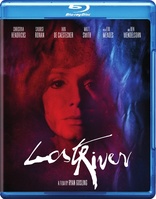
Movie rating
6.2 | / 10 |
Blu-ray rating
| Users | 0.0 | |
| Reviewer | 3.0 | |
| Overall | 3.0 |
Overview
Lost River (2014)
A single mother is swept into a dark underworld, while her teenage son discovers a road that leads him to a secret underwater town.
Starring: Christina Hendricks, Iain De Caestecker, Saoirse Ronan, Matt Smith, Ben MendelsohnDirector: Ryan Gosling
| Drama | Uncertain |
| Psychological thriller | Uncertain |
| Surreal | Uncertain |
| Mystery | Uncertain |
| Film-Noir | Uncertain |
| Fantasy | Uncertain |
| Thriller | Uncertain |
Specifications
Video
Video codec: MPEG-4 AVC
Video resolution: 1080p
Aspect ratio: 2.40:1
Original aspect ratio: 2.39:1
Audio
English: DTS-HD Master Audio 5.1 (48kHz, 24-bit)
Subtitles
English SDH, Spanish
Discs
50GB Blu-ray Disc
Single disc (1 BD)
UV digital copy
Playback
Region free
Review
Rating summary
| Movie | 2.5 | |
| Video | 4.5 | |
| Audio | 4.5 | |
| Extras | 0.0 | |
| Overall | 3.0 |
Lost River Blu-ray Movie Review
"The wolves. If they're not already at your door, they're gonna be..."
Reviewed by Kenneth Brown May 2, 2015David Lynch. Nicolas Winding Refn. Gaspar Noé. Mario Bava. Derek Cianfrance. David Cronenberg. Leos Carax. Luis Buñuel. These are the filmmakers that spring to mind when wading through Ryan Gosling's muddled, overindulgent directorial debut, Lost River. And not because the actor turned writer/director has crafted a spellbinding, carefully honed love letter to his cinematic passions. If only. More a fractured, schizophrenic student film swaddled in the rapturously hypnotic visuals of cinematographer Benoît Debie (Enter the Void, Spring Breakers) than a compelling plunge into dark, modern fairytaling, it billows and writhes, provokes and unsettles, and ultimately alienates and repels with a cold, hollow story populated by contrived victims of circumstance and deeply damaged opportunists. It's teeming with ideas but lacking in focus. Confident in its style but insecure in its substance. Fascinating in its approach but frustrating in its arrival. It will lure you in, entrance, disturb and unnerve, all while promising a gripping descent into the surreal, only to disappoint with a murky, convoluted dreamscape that will resonate with few people beyond Gosling.
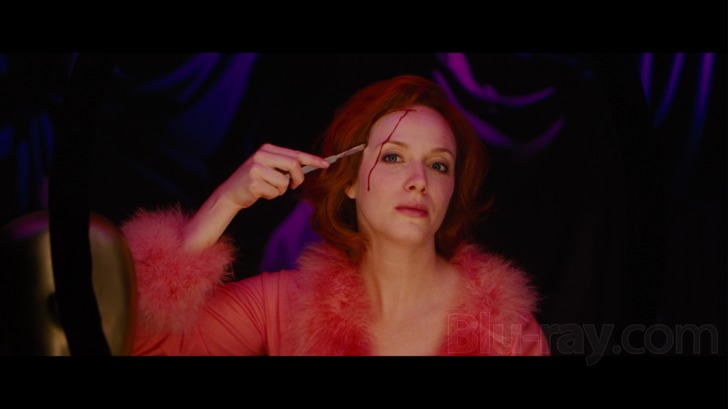
"Well, it's close. And somewhere over the rainbow, let's put it that way. I think you'll like it."
In the fading, forsaken town of Lost River, a single mother of two named Billy (Christina Hendricks, Driver), desperate to save her childhood home from foreclosure and demolition, follows the advice of her loans officer, Dave (a superbly creepy Ben Mendelsohn, The Place Beyond the Pines), and applies for a job at an underground club in the heart of the city. The club's burlesque performers, led by the kindly Cat (Eva Mendes, Holy Motors), specialize in the macabre and the grotesque, staging brutal murders, suicides, bodily mutilation and other horrors for an audience with insatiably bloody appetites. Billy is reluctant to join, explaining that she doesn't have any particular talents, but soon finds herself on stage, straight razor in hand, to the stunned delight of a hushed crowd. But Dave, who also happens to be the club's owner, has more sinister plans for Billy; plans that will force her to make a series of difficult decisions with her family's very survival on the line.
Elsewhere, on the far side of Lost River, Billy's teenage son, Bones (Iain De Casestecker, Agents of Shield), searches for scrap metal in abandoned homes to sell for cash, only to anger a roving, thuggish madman named Bully (Matt Smith, Doctor Who), who scissors off the lips of anyone who crosses him. Bully has declared all scrap his and his alone; a threat that carries weight even amongst local recycling company representatives. Bones, though, is as determined to keep his house as his mother. With the help of his neighbor, Rat (Saoirse Ronan, Hanna), a young girl who lives with her catatonic grandmother (Barbara Steele, Black Sunday), he sets out to break the curse of Lost River, save his mother from the path she's chosen, and keep his family together at all costs.
Considering the level of ambiguity Gosling infuses into his crumbling American Dream, Lost River's story is surprisingly simple, and not at all hard to follow. A mother prostitutes herself in a wolf's den and has to escape the beast's clutches, while her son goes on a quest to obtain a magical talisman and kill a monster. That's about it. The meaning and significance Gosling attempts to weave into the narrative is where his debut fails, and it's in this artful but tiresome grasping at thoughtful social commentary and stylish straws that the film begins to lose its power. When Billy first enters Dave's club, it's a nauseating yet bizarrely captivating step into the bowels of a disquieting nightmare. Subsequent visits are just as intriguing, so much so that Lost River quickly gains the surreal momentum Gosling was no doubt aiming for. Sadly, it comes undone as the fairy tale continues to unfold, with Bones' plight diverging too far from his mother's, Billy's struggles fizzling, Rat's subplot losing steam, and Bones' conflict with Bully hitting a frenzied climax just as Billy's time at the club is painted into a strangely anticlimactic corner.
The allure of Lynch, Refn and other cinematic surrealists is in the labyrinths they construct, dreamlike or otherwise. Gosling's Lost River is certainly labyrinthine, and certainly dreamlike, but there's a growing sense that the winding, twisting paths, dead ends, and newly revealed doorways of his REM maze don't lead anywhere of note. It's the journey, not the destination, you might argue, and any disciple of Lynch would agree. But there's often, if not always, a sense that Lynch, Refn, Noé, Bava, Carax, Buñuel, the masters of the genre, know their destination. It may be hidden from the viewer; left to us to dissect, decipher and debate. Maybe it's even lost to us forever. But it is known, and it guides each step of the journey, whether the film's innate or meticulous craftsmanship is apparent or not. It's felt. Intuited. Gosling's journey, by contrast, feels increasingly scattershot and erratic. His Lost River doesn't seem to embrace a singular vision so much as it repurposes the visions of others, stitching nods to various filmmakers together in an attempt to make a patchwork cult classic. But it's Debie's cinematography that masks the seams, not Gosling's direction or script. Striking visuals that linger on the imagination, not the express or not so express meaning or significance behind those visuals. The actors' performances that elevate each scene, not the dialogue they're given.
And yet it's entirely possible Lost River is perfectly Lynchian, wonderfully Refnian, in that it's divisive nature has done exactly what Gosling and his contemporaries know such films will do: irritate the masses while engaging a select few. The masses hated Refn's Only God Forgives. And I mean hated it. I thought it was breathtaking and brilliant. Still do. I am one of its select few. Here, I'm standing on the outside. I am one of the Lost River masses, wondering how Gosling's select few could see anything but pretension in its muddy waters. Who's right? Who's wrong? All of us and none of us, thank the cinematic gods. The thing that will always keep film fresh, new filmmakers innovating, risk-takers taking risks, artists creating, is the presence of the ever-shifting, ever-evolving eye of the beholder. I was disappointed with Lost River. Perhaps because I expected too much, perhaps because I wanted so badly to enjoy it. But I was disappointed. Others won't be, and it would be a shame for Gosling's success or failure to be defined by anything other than this: does Lost River connect with someone? Anyone? If so, it was a film worth making.
I don't regret watching it for a second; discovering whether I was a member of the masses or the select few. And, believe it or not, I'm looking forward to Gosling's next film, hoping that the largely negative reception of his debut doesn't snuff out the spark that inspired him to direct in the first place.
For a second impression of Lost River, take a moment to read Brian Orndorf's theatrical review.
Lost River Blu-ray Movie, Video Quality 
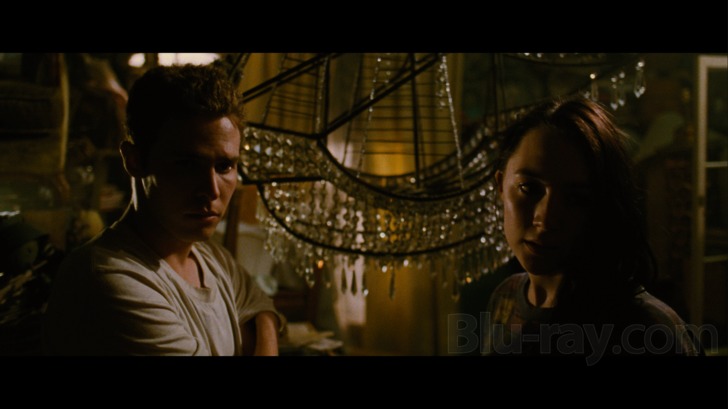
Lost River boasts a 1080p/AVC-encoded video presentation that's as striking as Benoît Debie's cinematography, reveling in bold swaths of color and shadow to create a suitably atmospheric descent into darkness. Debie's palette is rich and evocative, with flashes of vibrant primary brilliance, beautifully distressed earthen hues, and eerie, bottomless blacks. Fleshtones are precisely saturated at all times, and contrast, though stark, is consistent and consistently satisfying, with only minor instances of black and red crush. Detail is terrific throughout as well (insofar as the photography permits). Edge definition is clean and refined, textures are well-resolved, and close-ups are rarely lacking. There also isn't any banding, macroblocking or aliasing, and the only noise that appears, especially during sequences that take place at night, is inherent to the image. Lost River couldn't look much better than it does here.
Lost River Blu-ray Movie, Audio Quality 
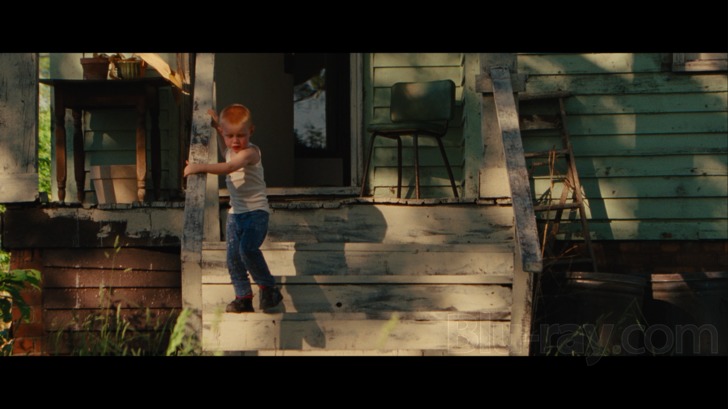
If the strength and effectiveness of Lost River's DTS-HD Master Audio 5.1 surround track isn't readily apparent from the outset, it will be by film's end. Johnny Jewel's score pulses, thrums, crescendos then presses the advantage, rising from the center of the soundfield and rippling outwards, complementing Debie's visuals with an unsettling intensity and engaging, dreamlike vitality. LFE output is bold and assertive, the rear speakers surge and relent, and the film's soundscape, whether naturalistic or surreal, is only overwhelmed by the music when Gosling and Jewel allow. Ambient and directional effects are as subtle or jarring as required too, cross-channel pans are transparent, and dynamics impress. Dialogue is more hit or miss, with voices that are sometimes drowned in the chaos, music, or both, but again, only as the film's sound design and Gosling's intentions dictate. The soundscape isn't neatly arranged or traditionally prioritized; it's often designed to disorient, discomfort or knock the listener off balance, particularly as Billy explores the depths of Dave's club. (A handful of scenes feature actors speaking from behind thick glass, and their dialogue audio is muffled accordingly.) Bottom line: without any issues to hinder the mix, Warner's lossless track only enhances the experience.
Lost River Blu-ray Movie, Special Features and Extras 
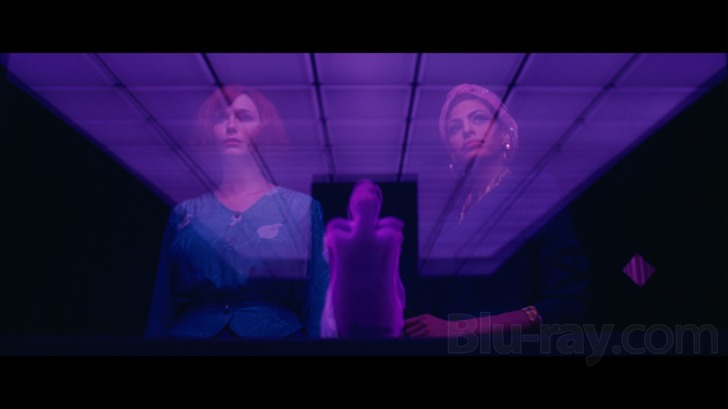
The Blu-ray release of Lost River doesn't include any special features.
Lost River Blu-ray Movie, Overall Score and Recommendation 
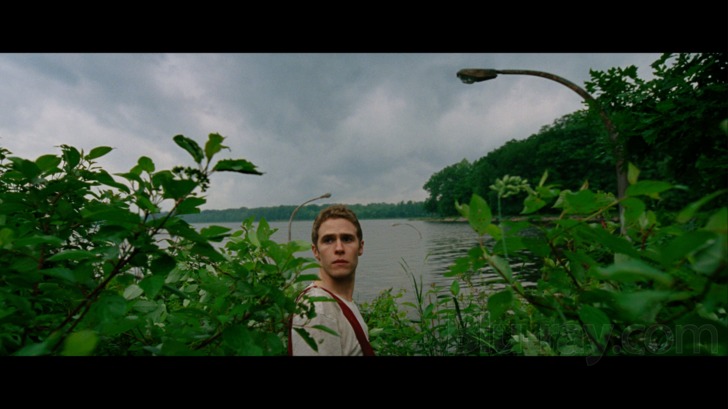
It occurred to me that Lost River might be an acquired taste. Or that its ambiguity would take on a deeper significance if I only watched the film multiple times. Three viewings later and I'm as convinced as ever that Gosling's directorial debut is a doting assemblage of influences and inspirations -- the films of Lynch, Refn and others -- rather than a hypnotic product of those influences and inspirations. It's a fine line, but one that's never seemed more clear. Still, the beauty of surreal cinema is that it tends to alienate a majority of its potential audience before finding a small contingent that appreciates its finer qualities. There's a very good chance you'll be as disappointed by Lost River as I was... but there's also a chance you'll feel differently. Either way, there's no harm in giving it a spin, if only to join the often riveting discussions that spring up around these sorts of films. Warner's Blu-ray release certainly makes it easier to enjoy Benoît Debie's cinematography and Johnny Jewel's score, thanks to a terrific AV presentation. It's just a shame there aren't any special features. I would have loved to hear a filmmaker's commentary, or watched Gosling work via a production documentary; anything that might shed further light on the film and his process. Would I appreciate Lost River more? It's possible. But then these films do seem to resonate more when audiences are given the chance to interpret things in a relative vacuum, without filmmaker input or interference.
Similar titles
Similar titles you might also like

The Ghost Writer
2010

Secret Beyond the Door
4K Restoration
1947

Rebecca
1940

The Night of the Hunter
1955

The Game
1997

Black Swan
2010

Don't Look Now
1973

Mulholland Drive 4K
2001

Blow Out
1981

Kiss Me Deadly
1955

Lost Highway
1997

Affair in Trinidad
1952

The Parallax View
1974

Obsession
Collector's Edition
1976

Following
Theatrical Version and Chronological Edit
1998

The Conversation
1974

The Manchurian Candidate
1962

Sleuth
2007

Klute
1971

Winter's Bone
2010
